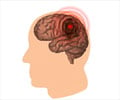Scientists suggest that neuroprosthetic brain implants may help stroke patients to overcome partial paralysis.
Scientists suggest that neuroprosthetic brain implants may help stroke patients to overcome partial paralysis.
The researchers from Washington University School of Medicine in St. Louis discovered that implants known as brain-computer interfaces (BCI) may be able to detect activity on one side of the brain that is linked to hand and arm movements on the same side of the body.They hope to use these signals to guide motorized assistance mechanisms that restore mobility in partially paralyzed limbs.
"In recent years, though, we've come to realize that there's actually some ipsilateral, or same-sided control signals involved in movement," said senior author Dr Eric C. Leuthardt, assistant professor of neurological surgery, of neurobiology and of biomedical engineering at Washington University School of Medicine in St. Louis and a physician at Barnes-Jewish Hospital.
"Now we've shown these signals can be detected and are separable from signals that control the opposite side of the body, which means we may be able to use a BCI to restore function," he added.
For the new study, researchers worked with six epilepsy patients. To identify brain areas where seizures originated for possible surgical removal, physicians had temporarily implanted grids of electrodes on the surfaces of patients' brains.
This allowed the researchers to ask the patients to perform tasks with their hands and check if the electrode grids could pick up ipsilateral brain signals during the tasks.
"Three of our patients could use these signals or opposite-sided hand control signals to move a computer cursor on a screen."
The implant relays brain signals to the computer, which interprets those signals to control prosthetic devices or other means of interacting with the environment.
The study was published online in the journal Stroke.
Source-ANI
LIN
 MEDINDIA
MEDINDIA



 Email
Email










